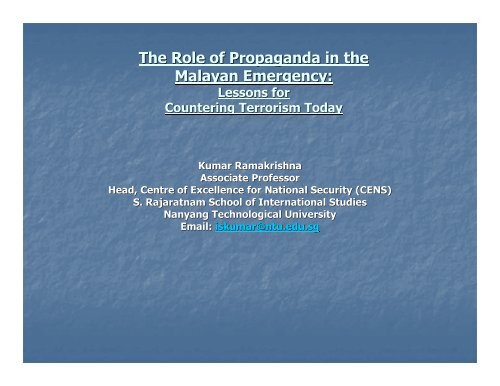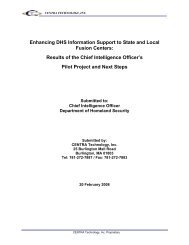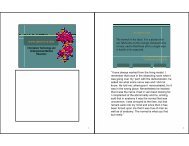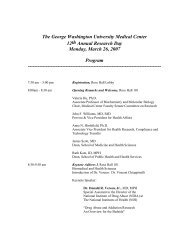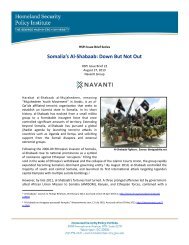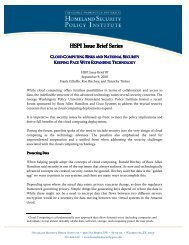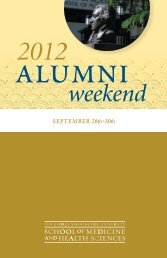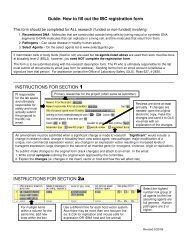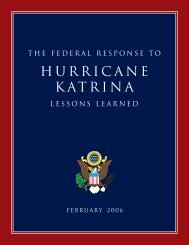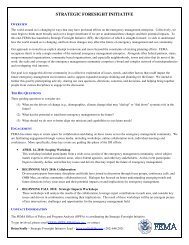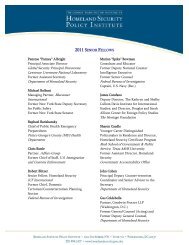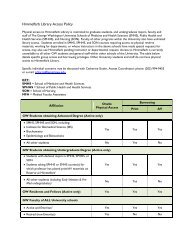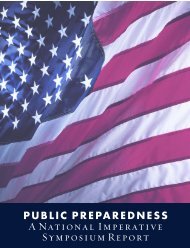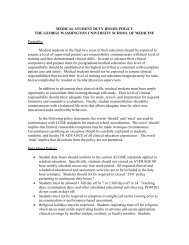The Role of Propaganda in the Malayan Emergency - S. Rajaratnam ...
The Role of Propaganda in the Malayan Emergency - S. Rajaratnam ...
The Role of Propaganda in the Malayan Emergency - S. Rajaratnam ...
You also want an ePaper? Increase the reach of your titles
YUMPU automatically turns print PDFs into web optimized ePapers that Google loves.
<strong>The</strong> <strong>Role</strong> <strong>of</strong> <strong>Propaganda</strong> <strong>in</strong> <strong>the</strong><br />
<strong>Malayan</strong> <strong>Emergency</strong>:<br />
Lessons for<br />
Counter<strong>in</strong>g Terrorism Today<br />
Kumar Ramakrishna<br />
Associate Pr<strong>of</strong>essor<br />
Head, Centre <strong>of</strong> Excellence for National Security (CENS)<br />
S. <strong>Rajaratnam</strong> School <strong>of</strong> International Studies<br />
Nanyang Technological University<br />
Email: iskumar@ntu.edu.sg
Aims <strong>of</strong> Talk<br />
<br />
To Exam<strong>in</strong>e how <strong>the</strong> British Colonial<br />
Government <strong>in</strong> Malaya Employed<br />
<strong>Propaganda</strong> <strong>in</strong> <strong>the</strong> CT campaign aga<strong>in</strong>st<br />
<strong>the</strong> <strong>Malayan</strong> Races Liberation Army<br />
(MRLA) 1948-1958<br />
1958<br />
<br />
To Identify Possible “Lessons” for CT<br />
Today
Quick Def<strong>in</strong>itions<br />
<br />
<br />
<br />
<br />
Terrorism is a very controversial phenomenon with no universally<br />
accepted legal def<strong>in</strong>ition<br />
Work<strong>in</strong>g def<strong>in</strong>ition <strong>of</strong> Terrorism: <strong>the</strong> employment, or threat <strong>of</strong><br />
employment, <strong>of</strong> extra-normal violence by an organized group<br />
aga<strong>in</strong>st noncombatants - <strong>in</strong> order to compel <strong>the</strong> wider community<br />
to comply with <strong>the</strong> organized group’s s political agenda<br />
Insurgency: an armed campaign organized and directed by a<br />
group <strong>of</strong> counter-elites elites seek<strong>in</strong>g to transform <strong>the</strong> political status<br />
quo <strong>in</strong> desired ways<br />
Counter-elites elites <strong>of</strong>ten direct <strong>the</strong>ir <strong>in</strong>surgent forces <strong>in</strong> guerrilla<br />
warfare aga<strong>in</strong>st police and military targets eg. . Hit-and<br />
and-run attacks<br />
on urban/rural police and outposts; ambushes <strong>of</strong> security patrols;<br />
sabotage <strong>of</strong> anmunition dumps and supply depots etc.
Quick Def<strong>in</strong>itions<br />
<br />
Counter-elites elites <strong>of</strong>ten permit <strong>the</strong>ir <strong>in</strong>surgent<br />
forces to use terrorism as a method <strong>in</strong><br />
<strong>the</strong>ir armed campaign eg. . Urban<br />
bomb<strong>in</strong>gs, assass<strong>in</strong>ations <strong>of</strong> politicians,<br />
government <strong>of</strong>ficials and government-<br />
l<strong>in</strong>ked civilians <strong>in</strong> cities and town centres<br />
<br />
This is why <strong>the</strong> <strong>Malayan</strong> <strong>Emergency</strong> may<br />
hold certa<strong>in</strong> “lessons” for CT operations<br />
today
<strong>Malayan</strong> <strong>Emergency</strong> (1948-1960)<br />
1960)<br />
<br />
Refers to <strong>the</strong> post-WW2 COIN/CT campaign waged by <strong>the</strong> British<br />
colonial government and later <strong>the</strong> <strong>in</strong>dependent <strong>Malayan</strong> government<br />
aga<strong>in</strong>st <strong>the</strong> MRLA<br />
By <strong>the</strong> time <strong>the</strong> Federation <strong>of</strong> Malaya was <strong>in</strong>augurated <strong>in</strong> Feb 1948,<br />
<strong>the</strong> country was a plural society – <strong>the</strong> British preserved <strong>the</strong> political<br />
dom<strong>in</strong>ance <strong>of</strong> <strong>the</strong> Malay feudal elites as well as <strong>the</strong> privileged political p<br />
status <strong>of</strong> <strong>the</strong> Malays; strict citizenship requirements for Ch<strong>in</strong>ese e and<br />
Indians<br />
<br />
<br />
<br />
<strong>The</strong> MRLA was basically <strong>the</strong> Communist party <strong>of</strong> Malaya (CPM) <strong>in</strong><br />
“battledress” – evolved from <strong>the</strong> MPAJA, that had operated with <strong>the</strong><br />
British Force 136 dur<strong>in</strong>g <strong>the</strong> Japanese Occupation <strong>of</strong> Malaya (Feb<br />
1942-Sep 1945)<br />
MRLA sought, through force <strong>of</strong> arms, to vanquish <strong>the</strong> British from<br />
Malaya and set up a Communist Republic <strong>of</strong> Malaya based on <strong>the</strong><br />
Maoist model – many CPM/MRLA members had strong emotional<br />
connections with <strong>the</strong> CCP<br />
At its 1951 peak <strong>of</strong> terrorist activity, MRLA had about 8000 men under<br />
arms, plus supported by a logistics network scattered throughout <strong>the</strong><br />
jungle fr<strong>in</strong>ges <strong>of</strong> western Malaya <strong>the</strong> so-called 50000-strong M<strong>in</strong> Yuen<br />
– drawn largely from <strong>the</strong> rural Ch<strong>in</strong>ese community – timber workers,<br />
squatter-farmers, rubber estate workers, t<strong>in</strong> m<strong>in</strong>ers – <strong>the</strong> key<br />
constituency <strong>in</strong> relation to <strong>the</strong> COIN aspect <strong>of</strong> <strong>the</strong> <strong>Emergency</strong>
Early British COIN/CT Approach to MRLA:<br />
Coercion <strong>the</strong> Key<br />
<br />
Security Force strength by 1950s: 23 battalions, 60 000 police,<br />
250 000 Home Guards<br />
From 1948-1952, 1952, adopted a hard-l<strong>in</strong>e COIN /CT approach:<br />
<br />
<br />
<br />
Forced resettlement <strong>of</strong> rural Ch<strong>in</strong>ese from exposed jungle<br />
fr<strong>in</strong>ge to defended but ill-equipped Resettlement Areas near<br />
towns<br />
Mass detentions and deportations <strong>of</strong> rural Ch<strong>in</strong>ese<br />
communities deemed guilty <strong>of</strong> non-co<br />
co-operation operation with<br />
authorities<br />
Collective punishment/f<strong>in</strong>es on villages and small towns<br />
suspected <strong>of</strong> collud<strong>in</strong>g with terrorists
One Big Reason for <strong>the</strong> Hard-L<strong>in</strong>e COIN /CT<br />
Approach:<br />
British Imperial Polic<strong>in</strong>g Habits<br />
<br />
<br />
<br />
<br />
<br />
“Irish” Model <strong>of</strong> Polic<strong>in</strong>g – orig<strong>in</strong>ated <strong>in</strong> British imperial<br />
context where Colonial Office <strong>in</strong> London needed to control far-<br />
flung colonies<br />
Key senior imperial police <strong>of</strong>ficers came from <strong>the</strong> 1920s<br />
paramilitary Royal Irish Constabulary <strong>in</strong> Nor<strong>the</strong>rn Ireland<br />
Many imperial police personnel recruited from ranks <strong>of</strong><br />
soldiers and had a “military m<strong>in</strong>dset”<br />
Lacked cultural aff<strong>in</strong>ity with population to be policed<br />
“Irish model” transmitted to Palest<strong>in</strong>e 1930s, <strong>the</strong>n Malaya<br />
1940s-early 1950s
<strong>The</strong> O<strong>the</strong>r Reason for <strong>the</strong> Hard-L<strong>in</strong>e COIN /CT Approach: :<br />
Racial Stereotypes<br />
<br />
Rural Ch<strong>in</strong>ese terrified <strong>of</strong> <strong>Malayan</strong> Police – European<br />
<strong>of</strong>ficers and Malay police rank and file and “Special<br />
Constables”<br />
<br />
Assumption by non-Ch<strong>in</strong>ese speak<strong>in</strong>g European <strong>of</strong>ficers<br />
that every Ch<strong>in</strong>ese was a potential Communist<br />
<br />
<strong>The</strong> Ch<strong>in</strong>ese had a “secret society complex” thus have to<br />
use hard l<strong>in</strong>e with <strong>the</strong>m<br />
<br />
Perceived need to have a “strong hand” with <strong>the</strong><br />
Ch<strong>in</strong>ese – Police Commissioner Nicol Gray – thousands<br />
deta<strong>in</strong>ed, deported to Ch<strong>in</strong>a; collective f<strong>in</strong>es; 22-hour<br />
curfews; mass rural Ch<strong>in</strong>ese alienation
COIN Turn<strong>in</strong>g Po<strong>in</strong>t: 1952 Onwards<br />
<br />
Arrival <strong>of</strong> High Commissioner and Director <strong>of</strong> <strong>Emergency</strong> Operations<br />
LG Gerald Templer and Commissioner A.E. Young from City <strong>of</strong> London<br />
Police<br />
<br />
<br />
<br />
Community polic<strong>in</strong>g approach – “police must be part <strong>of</strong> <strong>the</strong> people and<br />
people part <strong>of</strong> <strong>the</strong> police”; ; Young launched massive retra<strong>in</strong><strong>in</strong>g<br />
programme <strong>of</strong> Malay police and Specials; Europeans attended<br />
Cantonese/Hokkien<br />
language courses<br />
Operation Service launched at end-1952<br />
– Police as “Friend <strong>of</strong> <strong>the</strong><br />
Public”<br />
By end-1954/early 1955 – <strong>in</strong>creas<strong>in</strong>g rural Ch<strong>in</strong>ese confidence <strong>in</strong><br />
Police and Government
A Note on “<strong>Propaganda</strong>”<br />
<br />
Refers to any relevant mass communications that<br />
<strong>in</strong>fluence <strong>the</strong> th<strong>in</strong>k<strong>in</strong>g and behavior <strong>of</strong> a target<br />
audience<br />
<br />
In Malaya <strong>Propaganda</strong> covered not just “words” –<br />
speeches by Surrendered Enemy Personnel (SEP),<br />
radio broadcasts, mobile film unit exhibitions <strong>in</strong> <strong>the</strong><br />
countryside; leaflets dropped along jungle path by<br />
patrols and aircraft; voice aircraft broadcasts<br />
<br />
But also deeds: : both planned and unplanned
A Note on “<strong>Propaganda</strong>”<br />
<br />
<br />
<br />
<br />
In Malaya, <strong>the</strong> follow<strong>in</strong>g also represented positive<br />
“propaganda <strong>of</strong> deeds” to <strong>the</strong> rural Ch<strong>in</strong>ese community:<br />
Templer’s end<strong>in</strong>g <strong>of</strong> hugely unpopular mass detention<br />
and deportation policy, end <strong>of</strong> collective punishment as<br />
well<br />
<strong>The</strong> upgrad<strong>in</strong>g <strong>of</strong> Resettlement Areas <strong>in</strong>to well-guarded,<br />
properly sited, well-equipped<br />
equipped “New Villages”<br />
<strong>The</strong> <strong>in</strong>auguration <strong>of</strong> so-called<br />
“White Areas” <strong>in</strong> Sep<br />
1953, where ord<strong>in</strong>ary people could move around freely<br />
and live normally without <strong>Emergency</strong> restrictions
More Positive “<strong>Propaganda</strong>”<br />
<br />
<br />
<br />
Improved police tra<strong>in</strong><strong>in</strong>g and PR campaigns to turn <strong>Malayan</strong><br />
Police from a paramilitary force <strong>in</strong>to a community polic<strong>in</strong>g<br />
service<br />
Civics Courses <strong>in</strong> which government brought busloads <strong>of</strong><br />
ord<strong>in</strong>ary rural folk to urban centres to see at close hand<br />
how Govt worked, closed <strong>the</strong> “emotional gap” between <strong>the</strong><br />
rural Ch<strong>in</strong>ese and <strong>the</strong> police and district <strong>of</strong>ficials – gradually<br />
remove rural Ch<strong>in</strong>ese fear <strong>of</strong> <strong>the</strong> so-called wicked, corrupt<br />
“mata-mata”<br />
Templer mov<strong>in</strong>g around <strong>in</strong> armed motorcades, <strong>in</strong> order to<br />
“project power” and assure rural communities <strong>of</strong> Govt<br />
protection from MRLA atrocities -”Tuan Governor’s”<br />
calculated ubiquity
Tuan Governor’s<br />
Calculated Ubiquity
Negative “<strong>Propaganda</strong>”<br />
<br />
In Malaya, <strong>the</strong> follow<strong>in</strong>g represented negative<br />
“propaganda <strong>of</strong> deeds” to <strong>the</strong> rural Ch<strong>in</strong>ese community:<br />
<br />
Poor policy: mass detentions, deportations, collective<br />
punishments, forced resettlements <strong>in</strong>to poorly developed<br />
Resettlement Areas early on<br />
<br />
Overly harsh, unpr<strong>of</strong>essional Security Force behavior<br />
toward <strong>the</strong> rural Ch<strong>in</strong>ese – “fear <strong>of</strong> Police” was a key driver<br />
<strong>of</strong> young Ch<strong>in</strong>ese decamp<strong>in</strong>g to <strong>the</strong> jungle to jo<strong>in</strong> MRLA <strong>in</strong><br />
1948/49<br />
<br />
Large-scale military operations, aerial bomb<strong>in</strong>g sorties that<br />
created collateral damage amongst rural Ch<strong>in</strong>ese civilians<br />
and paradoxically, “battle <strong>in</strong>oculation” for MRLA guerrillas,<br />
or “CTs”<br />
<br />
Sir Robert Thompson quote: “One bomb that misses its<br />
target and kills a child will create a thousand new<br />
enemies” – importance <strong>of</strong> “m<strong>in</strong>imum force”
Young’s s Philosophy<br />
<br />
Importance <strong>of</strong> “m<strong>in</strong>imum force” – whole idea was to<br />
behave well, control use <strong>of</strong> force, w<strong>in</strong> public confidence<br />
and spark <strong>in</strong>telligence flow on CTs – police, not <strong>the</strong><br />
military, should be <strong>the</strong> “sharp end <strong>of</strong> <strong>the</strong> stick” <strong>in</strong><br />
COIN/CT operations<br />
<br />
To get <strong>in</strong>formation, soldiers and paramilitary police<br />
tended to use harsh <strong>in</strong>terrogation methods and impose<br />
curfews that won few friends and created new enemies<br />
Contemporary axiom? See Joshua Key’s <strong>The</strong> Deserter’s<br />
Tale, , about US army deserter <strong>in</strong> Iraq<br />
<br />
Young wanted more <strong>of</strong> friendly neighborhood “bobby on<br />
<strong>the</strong> beat” model ra<strong>the</strong>r than paramilitary police no<br />
different from regular army
Young’s s Philosophy<br />
<br />
Soldiers were tra<strong>in</strong>ed to make up m<strong>in</strong>ds<br />
fast so as to act quickly – and<br />
sometimes <strong>the</strong>y believed that a wrong<br />
decision was better than none at all.<br />
<br />
Police had to take more time, “because<br />
<strong>the</strong> important th<strong>in</strong>g wherever <strong>the</strong> law is<br />
<strong>in</strong>volved is to be right from <strong>the</strong> start”.
In Short, <strong>in</strong> Malaya…<br />
<br />
<strong>The</strong> British Colonial Government began to slowly turn<br />
th<strong>in</strong>gs around <strong>in</strong> <strong>the</strong> COIN/CT campaign when it<br />
recognized that <strong>the</strong> most important th<strong>in</strong>g was to deny<br />
<strong>the</strong> MRLA <strong>the</strong> hearts and m<strong>in</strong>ds <strong>of</strong> <strong>the</strong> key community –<br />
<strong>in</strong> this case <strong>the</strong> rural Ch<strong>in</strong>ese.<br />
<br />
This meant that “all-<strong>of</strong>-government”, , not just <strong>the</strong><br />
<strong>Malayan</strong> Police, but <strong>the</strong> Army, <strong>the</strong> District Officers on<br />
<strong>the</strong> ground, had to be more community-oriented, oriented, more<br />
politically sensitized – <strong>in</strong> DGIS Alec Petersen’s s phrase:<br />
everybody had to be “propaganda-m<strong>in</strong>ded”.
Lessons for CT Today?<br />
<br />
Today’s s Religiously-Inspired Terrorism is an Extreme<br />
Form <strong>of</strong> Identity Politics<br />
Political ideology couched <strong>in</strong> religious language<br />
Because <strong>the</strong> terrorists exploit religion for political<br />
purposes, <strong>the</strong>y do have sources <strong>of</strong> support <strong>in</strong> <strong>the</strong><br />
wider religious community<br />
CT operations <strong>in</strong> order to elim<strong>in</strong>ate <strong>the</strong> terrorist<br />
threat - without alienat<strong>in</strong>g <strong>the</strong> wider community<br />
from which <strong>the</strong> terrorists emerge - are very<br />
critical
Law Enforcement Errors that May have<br />
Adverse Political Consequences<br />
<br />
Over-reliance reliance on force <strong>in</strong> deal<strong>in</strong>g with <strong>in</strong>dividual<br />
terrorists; <strong>the</strong>y have families and sibl<strong>in</strong>gs that may be<br />
motivated by revenge to jo<strong>in</strong> <strong>the</strong> terrorists as well;<br />
<br />
Mistakes <strong>in</strong> arrest<strong>in</strong>g or worse, kill<strong>in</strong>g <strong>in</strong>dividuals<br />
suspected <strong>of</strong> terrorist <strong>in</strong>volvement<br />
<br />
Lack <strong>of</strong> sensitivity <strong>in</strong> secur<strong>in</strong>g <strong>in</strong>formation from <strong>the</strong><br />
religious community; disrespect <strong>in</strong> search<strong>in</strong>g homes,<br />
places <strong>of</strong> worship – all fuel <strong>the</strong> religious extremists’<br />
Storyl<strong>in</strong>e <strong>of</strong> a religious community be<strong>in</strong>g treated like<br />
“2 nd -class citizens”.
“<strong>Propaganda</strong>-M<strong>in</strong>ded” CT Policy <strong>the</strong> Key<br />
<br />
Tra<strong>in</strong> <strong>of</strong>ficers and men not merely <strong>in</strong> police procedures<br />
with respect to terrorists and <strong>the</strong> wider community <strong>of</strong><br />
support but ALSO <strong>in</strong> <strong>the</strong> potential political consequences<br />
<strong>of</strong> <strong>the</strong> application <strong>of</strong> those procedures <strong>in</strong> <strong>the</strong> context <strong>of</strong><br />
<strong>the</strong> war on terrorism.<br />
<br />
Sensitize security personnel and make <strong>the</strong>m<br />
“propaganda-m<strong>in</strong>ded”.<br />
<br />
Ensure that <strong>of</strong>ficers and men are able to w<strong>in</strong> confidence<br />
<strong>of</strong> <strong>the</strong> wider religious community through eg. . language<br />
tra<strong>in</strong><strong>in</strong>g, basic courtesy <strong>in</strong> deal<strong>in</strong>gs with people, ability<br />
to expla<strong>in</strong> unpopular policies
“<strong>Propaganda</strong>-M<strong>in</strong>ded” CT Policy <strong>the</strong> Key<br />
<br />
Create a “Bra<strong>in</strong>s Trust” on a “whole-<strong>of</strong>-<br />
government” basis tasked with promot<strong>in</strong>g<br />
propaganda-m<strong>in</strong>ded CT policy across <strong>the</strong><br />
broad, draw<strong>in</strong>g <strong>in</strong> police, military, NGOs,<br />
religious bodies and all o<strong>the</strong>r relevant<br />
agencies.<br />
<br />
In short, take deliberate and conscious care to<br />
avoid generat<strong>in</strong>g “political oxygen” that can<br />
<strong>in</strong>advertently fuel religious extremist Storyl<strong>in</strong>e<br />
and ensure more recruits
Conclusion<br />
<br />
<br />
<br />
<br />
<strong>The</strong> <strong>Malayan</strong> <strong>Emergency</strong> <strong>of</strong>fers us a couple <strong>of</strong> lessons:<br />
Not only what we say, but equally what we do,<br />
constitutes propaganda – for both good or ill<br />
Effective CT policy <strong>in</strong> urban sett<strong>in</strong>gs – which must seek<br />
to dra<strong>in</strong> <strong>the</strong> swamp <strong>of</strong> community support for urban<br />
terrorism-must must ensure that <strong>in</strong> <strong>the</strong> f<strong>in</strong>al analysis, <strong>the</strong><br />
message emanat<strong>in</strong>g from Government’s rhetoric is<br />
consistent with that emanat<strong>in</strong>g from its actual deeds.<br />
An <strong>in</strong>tegrationist propaganda-m<strong>in</strong>ded approach is<br />
essential to ultimate success <strong>in</strong> <strong>the</strong> CT operations <strong>in</strong><br />
urban sett<strong>in</strong>gs


